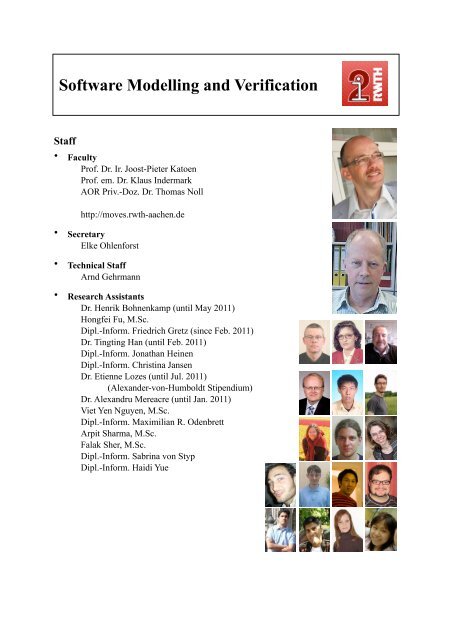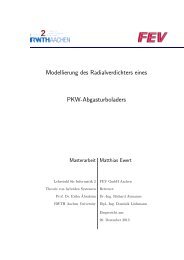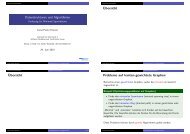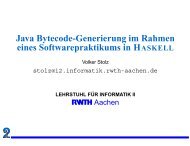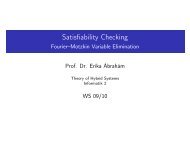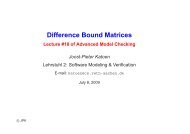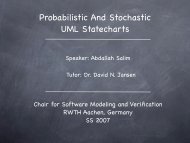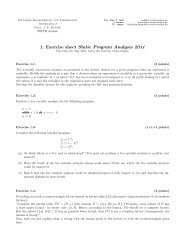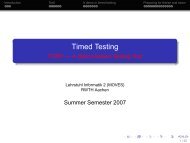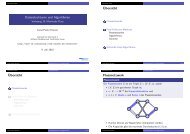Research Projects - Software Modeling and Verification - RWTH ...
Research Projects - Software Modeling and Verification - RWTH ...
Research Projects - Software Modeling and Verification - RWTH ...
Create successful ePaper yourself
Turn your PDF publications into a flip-book with our unique Google optimized e-Paper software.
<strong>Software</strong> Modelling <strong>and</strong> <strong>Verification</strong><br />
Staff<br />
• Faculty<br />
Prof. Dr. Ir. Joost-Pieter Katoen<br />
Prof. em. Dr. Klaus Indermark<br />
AOR Priv.-Doz. Dr. Thomas Noll<br />
http://moves.rwth-aachen.de<br />
• Secretary<br />
Elke Ohlenforst<br />
• Technical Staff<br />
Arnd Gehrmann<br />
• <strong>Research</strong> Assistants<br />
Dr. Henrik Bohnenkamp (until May 2011)<br />
Hongfei Fu, M.Sc.<br />
Dipl.-Inform. Friedrich Gretz (since Feb. 2011)<br />
Dr. Tingting Han (until Feb. 2011)<br />
Dipl.-Inform. Jonathan Heinen<br />
Dipl.-Inform. Christina Jansen<br />
Dr. Etienne Lozes (until Jul. 2011)<br />
(Alex<strong>and</strong>er-von-Humboldt Stipendium)<br />
Dr. Alex<strong>and</strong>ru Mereacre (until Jan. 2011)<br />
Viet Yen Nguyen, M.Sc.<br />
Dipl.-Inform. Maximilian R. Odenbrett<br />
Arpit Sharma, M.Sc.<br />
Falak Sher, M.Sc.<br />
Dipl.-Inform. Sabrina von Styp<br />
Dipl.-Inform. Haidi Yue
• Diploma/Bachelor/Master Students<br />
Markus Bals<br />
Henrik Barthels<br />
Lisa von Büttner<br />
Silvio de Carolis<br />
Jonas Dederichs<br />
Christian Dehnert<br />
Bernhard Ern<br />
Hussein Hamid Baagil<br />
Dirk Hauptmann<br />
Tobias Hoffmann<br />
Rafal Korzeniewski<br />
Gereon Kremer<br />
Bart Postma<br />
Hauke Schaper<br />
Stephen Wu<br />
• Student <strong>Research</strong>ers<br />
Christian Dehnert<br />
Aamer Shah<br />
Hannah Spitzer<br />
Dennis Guck<br />
• Visiting Scientists<br />
Aless<strong>and</strong>ro Abate (TU Delft, NL)<br />
Albert Benveniste (IRISA Rennes, F)<br />
Dragan Bosnacki (TU Eindhoven, NL)<br />
Marco Bozzano (FBK Trento, I)<br />
Souymodip Chakraborty (IIT Delhi, India)<br />
Taolue Chen (University of Oxford, UK)<br />
Andreas Classen (University of Namur, B)<br />
Pedro D'Argenio (University of Cordoba, Argentina)<br />
Hubert Garavel (INRIA Rhone-Alpes, F)<br />
Holger Hermanns (Saarl<strong>and</strong> University, D)<br />
Daniel Kroening (University of Oxford, UK)<br />
John Lygeros (ETH Zurich, CH)<br />
Hua Mao (Aalborg University, DK)<br />
Alex<strong>and</strong>ru Mereacre (University of Oxford, UK)<br />
Vivek Sarkar (Rice University, USA)<br />
Arnaud Sangnier (LIAFA, F)<br />
Mani Swaminathan (Universty of Oldenburg, D)<br />
Mark Timmer (University of Twente, NL)<br />
Yuri Yushtein (ESTEC, NL)<br />
Anton J. Wijs (TU Eindhoven, NL)
Overview<br />
Enormous progress has been booked in our research during 2011 which is reflected in the list<br />
of publications at the end of this section. In particular, the results of the ESA COMPASS project<br />
have had a large impact in the last year. The availability of a tool-set together with the<br />
successful application of the developed techniques by companies, have led to invited talks,<br />
invited tutorials (e.g., on one the largest European aerospace exhibitions), <strong>and</strong> formal inquiries<br />
from several (large) companies. This year the GUI will be finished, <strong>and</strong> an in-house case<br />
study for a new satellite system at ESA has been completed. It is great to see – <strong>and</strong> enormously<br />
stimulating! – that verification <strong>and</strong> dependability analysis techniques that are based on<br />
a firm theoretical basis indeed can have practical impact.<br />
In September the Aachen Concurrency <strong>and</strong> Dependability Week attracted 300 attendants from<br />
all around the globe to our university. This week, organised by our chair, consisted of:<br />
- the 22nd International Conference on Concurrency Theory (CONCUR);<br />
- the 8th International Conference on Quantitative Evaluation of Systems (QEST);<br />
- the 6th International Symposium on Trustworthy Global Computing (TGC).<br />
In addition 9 workshops <strong>and</strong> 6 tutorials were held by world experts in the field. The social<br />
program consisted of a reception in the historic Ballsaal in Aachen (see picture), <strong>and</strong> a guided<br />
tour, a boat trip <strong>and</strong> a banquet (on the boat) in Maastricht, The Netherl<strong>and</strong>s. The ability to<br />
visit 3 countries in (less than) a single day excited many of the attendants. To conclude,<br />
ACDW 2011 was a great success both scientifically as well as socially.
Other highlights during 2011:<br />
- Joost-Pieter Katoen received the Educational Price 2010 for the course on Data Structures<br />
<strong>and</strong> Algorithms;<br />
- Alex<strong>and</strong>ru Mereacre finished his doctoral studies with honours;<br />
- Falak Sher received an award for the best Master Thesis in the Department of Computer<br />
Science in 2010.<br />
On the personnel side, Tingting Han (postdoc) <strong>and</strong> Alex<strong>and</strong>ru Mereacre (PhD student) both<br />
left to join the group of Marta Kwiatkowska at the University of Oxford (UK), whereas Henrik<br />
Bohnenkamp continued his career in industry. In addition, our Alex<strong>and</strong>er-von-Humboldt<br />
visiting professor, Etienne Lozes (ENS Cachan, F) left to join the group of Martin Lange in<br />
Kassel. As new member to the chair, we welcome Friedrich Gretz, who started early this year<br />
as PhD student in the <strong>Research</strong> Training Group AlgoSyn.<br />
To conclude: 2011 was a busy, successful <strong>and</strong> exciting year, <strong>and</strong> we are looking forward to<br />
what 2012 will bring us.<br />
Joost-Pieter Katoen.
<strong>Research</strong> <strong>Projects</strong><br />
<strong>Verification</strong> of Quantitative Properties of Embedded <strong>Software</strong><br />
T. Han, J.-P. Katoen<br />
funded by the Dutch <strong>Research</strong> Council (NWO)<br />
Embedded software typically executes on devices that, first <strong>and</strong> foremost, are not personal<br />
computers. Due to its embedded nature, its robustness is of prime importance, <strong>and</strong> timely reactions<br />
to stimuli from its -- mostly physical -- environment are essential. The aim of the<br />
QUPES project is to assess these quantitative aspects (e.g., timeliness <strong>and</strong> robustness) as an<br />
integral part of the embedded software validation phase.<br />
To accomplish this, probabilistic model-checking techniques can be applied for models that<br />
are equipped with r<strong>and</strong>omness <strong>and</strong> variants thereof which also exhibit nondeterminism. Based<br />
on efficient numerical methods <strong>and</strong> abstraction techniques, quantitative properties can be<br />
checked automatically even on large state spaces with millions of states using dedicated tools.<br />
Opposed to, amongst others, the essential feature of model checking, where evidences will be<br />
provided on a property refutation, counterexample generation in probabilistic model checking<br />
is almost not developed. We provide the theoretical <strong>and</strong> algorithmic foundations for counterexample<br />
generation in probabilistic model checking, in particular for discrete-time Markov<br />
chains. One of the key principles is the casting of the concepts of strongest evidence <strong>and</strong><br />
smallest counterexample as (variants of) shortest path problems. This enabled the use of efficient<br />
<strong>and</strong> well-studied graph algorithms for counterexample generation. These results can be<br />
extended to Markov chains with rewards, to Markov decision processes (MDPs), to LTL<br />
model checking, <strong>and</strong> have been recently been adopted in probabilistic counterexample-guided<br />
abstraction-refinement (CEGAR) techniques for MDPs as well as in counterexample generation<br />
for continuous-time Markov chains (CTMC) <strong>and</strong> cpCTL logic. Compact representation<br />
of a counterexample by regular expressions are also studied.<br />
Further, compositional reasoning is a key strategy in analysing complex systems as it allows<br />
the use of hierarchical <strong>and</strong> modular modelling formalisms like stochastic process algebras,<br />
stochastic activity networks or generalised stochastic Petri nets. Continuous-time Markov Decision<br />
processes (CTMDPs) are the nondeterministic counterpart of the aforementioned<br />
CTMCs <strong>and</strong> are well suited for compositional verification techniques. We define stochastic<br />
logics (like CSL) on CTMDPs <strong>and</strong> provide their measure-theoretic basis. Further, well-known<br />
equivalences like strong <strong>and</strong> weak bisimulation relations are adapted to CTMDPs which considerably<br />
reduce the state-space needed for quantitative analysis.
Verifying Pointer Programs with Unbounded Heap Structures<br />
J. Heinen, C. Jansen, J.-P. Katoen, T. Noll<br />
The incorrect use of pointers is one of the most common sources of software errors. Proving<br />
the correctness of pointer-manipulating programs with unbounded heap, let alone algorithmically,<br />
is a highly non-trivial task. This project attempts to develop automated verification<br />
techniques <strong>and</strong> accompanying tool support for programs with memory allocation that h<strong>and</strong>le<br />
linked data structures which are potentially unbounded in their size.<br />
After considering (possibly cyclic) singly-linked list data structures, the approach was extended<br />
to analyse programs that h<strong>and</strong>le more complex dynamic data structures. We developed<br />
a novel abstraction framework that is based on graph grammars, more precisely context-free<br />
hyperedge replacement grammars, as an intuitive formalism for abstractly modelling dynamic<br />
data structures. The key idea is to use the replacement operations which are induced by the<br />
grammar rules in two directions. By a backward application of some rule, a subgraph of the<br />
heap can be condensed into a single nonterminal edge, thus obtaining an abstraction of the<br />
heap. By applying rules in forward direction, certain parts of the heap which have been abstracted<br />
before can be concretised again. This avoids the necessity for explicitly defining the<br />
effect of pointer-manipulating operations on abstracted parts of the heap.<br />
The central issues in this context are correctness, usability, <strong>and</strong> efficiency. The first essentially<br />
boils down to the requirement that a nonterminal can always be concretised to the data structure<br />
from which it was abstracted. To ensure his property, we defined a novel normal form for<br />
hyperedge replacement grammars that is inspired by the well-known Greibach normal form<br />
for string grammars. Moreover we developed an algorithm for constructing a normalised<br />
grammar from a given hyperedge replacement grammar with bounded degree.<br />
To improve the usability of the overall approach, the idea is to adopt learning techniques to<br />
automatically infer abstraction grammars for data structures. More concretely this means that<br />
the heap configurations arising during the execution of the given pointer-manipulating program<br />
have to be inspected at runtime, <strong>and</strong> that hypergraph production rules for generating<br />
these structures have to be found. This proceeds in an incremental fashion as more <strong>and</strong> more<br />
heap structures are created during runtime. The automatic generation of corresponding rules<br />
then circumvents the complex <strong>and</strong> error-prone procedure of developing grammars manually.<br />
The incremental construction of grammars also raises new challenges with regard to the Greibach<br />
normal form that was mentioned in the previous paragraph. Efficiency will be improved<br />
by avoiding the re-computation of the normal form for the whole grammar, instead using an<br />
incremental approach where the normal form of the extended grammar is obtained by adding<br />
new Greibach rules to the normal form of the previous grammar. A first step towards this direction<br />
was taken by developing an incremental algorithm for deriving the Greibach normal<br />
form of a string grammar.<br />
Another step for improving the efficiency of the approach was taken by developing an<br />
automata-theoretic concept for finding hypergraph embeddings, which is required for implementing<br />
grammar-based heap abstractions.
COMPASS: Correctness, Modelling <strong>and</strong> Performance of Aerospace Systems<br />
J.-P. Katoen, V.Y. Nguyen, T. Noll, C. Dehnert<br />
joint project together with the groups of Aless<strong>and</strong>ro Cimatti<br />
(Fondazione Bruno Kessler, Centre for Scientific <strong>and</strong> Technological <strong>Research</strong>, Trento, Italy),<br />
<strong>and</strong> Xavier Olive (Thales Alenia Space, On Board <strong>Software</strong> Department, Cannes, France)<br />
funded by European Space Agency (ESA)<br />
In this project we develop a model-based approach to system-software co-engineering which<br />
is tailored to the specific characteristics of critical on-board systems for the space domain.<br />
The approach is supported by a System-Level Integrated Modelling (SLIM) Language in<br />
which engineers are provided with convenient ways to specify a.o. nominal hardware, as well<br />
as software operations, timed <strong>and</strong> hybrid behaviour, (probabilistic) faults <strong>and</strong> their propagation,<br />
error recovery <strong>and</strong> degraded modes of operation. This language is based on the Architecture<br />
Analysis <strong>and</strong> Design Language (AADL) <strong>and</strong> its Error Model Annex which allows for the<br />
modelling of error behaviour. A kernel of the SLIM Language is equipped with a formal semantics<br />
that provides the interpretation of SLIM specifications in a precise <strong>and</strong> unambiguous<br />
manner. Systems are considered as a hierarchy of (hardware <strong>and</strong> software) components which<br />
are defined by their type (interface) <strong>and</strong> implementation. Components interact via ports allowing<br />
for both message-oriented <strong>and</strong> continuous communication. The internal structure of a<br />
component implementation is specified by its decomposition into subcomponents, together<br />
with their HW/SW bindings <strong>and</strong> their interaction via connections over ports. Component behaviour<br />
is specified by a textual description of mode-transition diagrams. System reconfiguration<br />
is supported by mode-dependent presence of subcomponents <strong>and</strong> their connections. Error<br />
behaviour is described by probabilistic finite state machines, where error delays may be<br />
governed by continuous r<strong>and</strong>om variables.<br />
Correctness properties, safety guarantees, <strong>and</strong> performance <strong>and</strong> dependability requirements<br />
are specified using requirement specification patterns which act as parametrized "templates"<br />
to the engineers <strong>and</strong> thus offer a comprehensible <strong>and</strong> easy-to-use framework for requirement<br />
specification.<br />
The properties are checked on the SLIM specification using rigorous analysis methods. The<br />
precise character of these techniques together with the formal semantics of SLIM yield a<br />
trustworthy modelling <strong>and</strong> analysis framework for system <strong>and</strong> software engineers. The formal<br />
analysis is based on state-of-the-art model checking techniques such as bounded SATbased<br />
<strong>and</strong> symbolic model checking, <strong>and</strong> extensions of model checking with numerical <strong>and</strong><br />
simulative means to reason about quantitative requirements such as performance <strong>and</strong> dependability.<br />
The analysis facilities support, among others: automated derivation of dynamic (i.e.,<br />
r<strong>and</strong>omly timed) fault trees, Failure Modes <strong>and</strong> Effects Analysis (FMEA) tables, assessment<br />
of Fault Detection, Isolation, <strong>and</strong> Recovery (FDIR) measures, <strong>and</strong> observability requirements<br />
for effective diagnosability by FDIR.<br />
An integrated platform on top of state-of-the-art tools with an accompanying graphical user<br />
interface is available, <strong>and</strong> has been evaluated by Thales Alenia Space using several case stud-
ies involving critical on-board computer-based systems from the satellite domain. Another<br />
outcome of the project is an extension of AADL's Error Model Annex <strong>and</strong> the corresponding<br />
semantics.<br />
Present activities concentrate on improving both the applicability <strong>and</strong> efficiency of the toolset.<br />
Currently the SLIM models to be analysed have to be provided in a textual format that is<br />
based on the syntax of AADL. This requires users to perform text-based system modelling.<br />
The usability <strong>and</strong> adoption of the COMPASS toolset will greatly benefit from the possibility<br />
of graphical model ling, allowing engineers to specify systems in a graphical notation that<br />
eases the underst<strong>and</strong>ing of their architecture <strong>and</strong> behaviour. To this aim, a graphical editor for<br />
SLIM models is being under development.<br />
Moreover we are addressing some shortcomings <strong>and</strong> limitations of the current dependability<br />
<strong>and</strong> performability analysis techniques of AADL models that been identified during evaluation.<br />
This particularly applies to systems that exhibit complex characteristics in terms of nondeterminism,<br />
timed <strong>and</strong> hybrid behaviour, <strong>and</strong> discrete <strong>and</strong> continuous-time probabilistic errors.<br />
Our goal is to specify formal semantics for such models, <strong>and</strong> to develop novel <strong>and</strong> advanced<br />
techniques to support their analysis. In particular, compositional techniques exploiting<br />
the hierarchical structure of component-based models will be required to combat the statespace<br />
explosion problem. Corresponding approaches are currently investigated in the framework<br />
of a PhD on "Extending <strong>and</strong> Improving Formal Methods for System/<strong>Software</strong> Co-<br />
Engineering", sponsored by both ESA <strong>and</strong> Thales Alenia Space.<br />
More information on the project is available at http://compass.informatik.rwth-aachen.de/
Quasimodo: Quantitive System Properties<br />
in Model-Driven Design of Embedded Systems<br />
H. Bohnenkamp, H. Yue, J.-P. Katoen<br />
EU FP7 project, coordinator: Aalborg University (K.G. Larsen)<br />
The MOVES group participates in the European research project "Quasimodo", funded by the<br />
European Commission under the IST framework programme 7 for Information <strong>and</strong> Communication<br />
Technology, ICT. The objective of this project is to develop theory, techniques <strong>and</strong><br />
tool components for h<strong>and</strong>ling quantitative (e.g. real-time, hybrid <strong>and</strong> stochastic) constraints in<br />
model-driven development of real-time embedded systems. Ultimate aim is to increase the<br />
competitiveness of European industrial companies which develop, implement <strong>and</strong> deploy embedded<br />
systems.<br />
More specifically, the project aims are:<br />
1. Improving the modelling of diverse quantitative aspects of embedded systems.<br />
2. Providing a wide range of powerful techniques for analysing models with quantitative information<br />
<strong>and</strong> for establishing abstraction relations between them.<br />
3. Generating code with predictable behaviour from quantitative models.<br />
4. Improving the overall quality of testing by using suitable quantitative models as the basis<br />
for generating sound <strong>and</strong> complete test cases.<br />
5. Applying the techniques to real-life case studies <strong>and</strong> disseminating the results to industry.<br />
Project partners are universities, research institutes, <strong>and</strong> companies in Germany, The Netherl<strong>and</strong>s,<br />
Denmark, Belgium, <strong>and</strong> France.<br />
UMIC: Ultra High Speed Mobile Information <strong>and</strong> Communication<br />
H. Yue, H. Bohnenkamp, J.-P. Katoen<br />
The evaluation of the quality-of-service of Wireless Sensor Networks is mostly done by simulation.<br />
In the context of the Quasimodo <strong>and</strong> UMIC projects, <strong>and</strong> in cooperation with the<br />
company CHESS, Haarlem, NL, we evaluated the second generation of a gossiping MAC<br />
protocol (GMAC), a TDMA protocol for completely unconfigured wireless networks, which<br />
aims to maintain message propagation with energy as low as possible.<br />
The new GMAC protocol is modelled with a specific radio model: SINR model of Gupta<br />
Kumar. And as network topology, we considered three different node arrangements: grid, uniformed<br />
distribution <strong>and</strong> Gaussian distribution.
Simulations, carried out with the MoDeST/Möbius tool set, show that comparing to the simple<br />
slotted Aloha protocol, the new GMAC has indeed a significant beneficial influence on<br />
energy consumption for all the three networks. However, it also delayed message propagation.<br />
Furthermore, we discovered that GMAC with constant sending power may cause a lot of interference<br />
in dense area, <strong>and</strong> in sparse area, nodes may disconnect to each other. Hence we<br />
proposed a dynamic energy scheduling schema, so that a node can regulate its sending power<br />
with respect to its current number of neighbours. Simulation results show that for Gaussian<br />
networks, our dynamic power management not only improved energy consumption, but also<br />
accelerated message propagation.<br />
Our current research aims at gathering evidence that the SINR model is in fact realistic<br />
enough to allow the derivation of reliable measures for wireless sensor networks using simulation.<br />
For that we try to explain measurement data from CHESS by means of the SINR<br />
model.<br />
Formal Models of Microcontroller Systems<br />
Th. Noll,<br />
J. Brauer (Chair of <strong>Software</strong> for Embedded Systems)<br />
Embedded systems usually operate in uncertain environments, giving rise to a high degree of<br />
nondeterminism in the corresponding formal models. Moreover they generally h<strong>and</strong>le data<br />
spaces whose sizes grow with the memory <strong>and</strong> the word length of the respective microcontroller<br />
architectures. This, together with other effects, leads to the well-known state-space explosion<br />
problem, meaning that the models of those systems grow exponentially in size as the<br />
parameter values increase. Careful h<strong>and</strong>ling of both nondeterminism <strong>and</strong> large data spaces is<br />
therefore crucial for obtaining efficient methods <strong>and</strong> tools for analysis <strong>and</strong> verification.<br />
The goal of this project, carried out in close cooperation with the Embedded <strong>Software</strong> Laboratory<br />
of our department, is to develop abstraction techniques to tackle this problem. With regard<br />
to control structures, a technique for refining loops in microcontroller programs has been<br />
developed. It is based on abstract interpretation using octagons <strong>and</strong> affine equalities in order<br />
to identify infeasible sequences of loop iterations. Our approach naturally integrates wraparound<br />
arithmetic during the generation of abstractions. Abstract interpreters operating on a<br />
refined control structure then typically derive strengthened program invariants without having<br />
to rely on complicated domain constructions.<br />
With regard to data spaces, activities have been concentrating on static analysis methods for<br />
approximating the possible run-time values of data values. For this purpose, intervals have<br />
successfully been used for decades. Binary code on microcontroller platforms, however, is<br />
different from high-level code in that data is frequently altered using bit-wise operations <strong>and</strong><br />
that the results of operations often depend on the hardware configuration. We therefore came<br />
up with a method that combines word- <strong>and</strong> bit-level interval analysis <strong>and</strong> that integrates a<br />
hardware model by means of abstract interpretation in order to h<strong>and</strong>le these peculiarities.<br />
Both techniques have successfully been applied to a suite of benchmark examples.
SYRUP: SYmbolic RedUction of Probabilistic Models<br />
J.-P. Katoen, C. Dehnert<br />
M. Timmer, M. Stoelinga, J. van de Pol (all three from University of Twente, NL)<br />
funded by the Dutch <strong>Research</strong> Council (NWO)<br />
Efficient model-checking algorithms exist for qualitative <strong>and</strong> quantitative properties for a<br />
range of probabilistic models. Their popularity is due to the presence of powerful software<br />
tools, <strong>and</strong> their wide applicability; security, distributed algorithms, systems biology, dependability<br />
<strong>and</strong> performance analysis, to mention a few. The main deficiencies of probabilistic<br />
model checking are the state explosion problem <strong>and</strong> the restricted treatment of data.<br />
The state space grows exponentially in the size of system components <strong>and</strong> data domains.<br />
Whereas most abstraction techniques obtain smaller models by collapsing sets of concrete<br />
states at the model level, this project takes a radically different approach. We will develop <strong>and</strong><br />
implement symbolic reduction techniques for probabilistic models. These techniques aim to<br />
reduce models by model transformations at the language level in order to minimise state<br />
spaces prior to their generation while preserving functional <strong>and</strong> quantitative properties. Our<br />
symbolic reductions will support data as first-class citizens, i.e., we will develop techniques to<br />
symbolically reduce formalisms for modelling probabilistic systems that are equipped with<br />
rich data types, allowing, e.g., probabilistic choices parameterised with data.<br />
Our approach is based on successful symbolic transformation techniques in the traditional <strong>and</strong><br />
timed setting, viz. linear process equations (LPEs). We will generalise <strong>and</strong> extend these techniques<br />
to probabilistic automata (PA), a model akin to Markov Decision Processes that is<br />
tailored to compositional modelling. The LPE technique is applicable to large or even infinite<br />
systems, <strong>and</strong> will be equipped with symbolic transformations such as confluence reduction,<br />
bisimulation minimisation <strong>and</strong> static analysis for PA.<br />
MoVeS: <strong>Modeling</strong>, <strong>Verification</strong> <strong>and</strong> Control of Complex Systems<br />
J.-P. Katoen, A. Mereacre, F. Sher<br />
EU FP7 project, coordinator: ETH Zurich (J. Lygeros)<br />
In the context of the EU FP7-project "Modelling, verification <strong>and</strong> control of complex systems:<br />
From foundations to power network applications" (partners: ETH Zurich, TU Delft,<br />
University of Oldenburg, Politecnico Milano, <strong>and</strong> Honeywell), we propose novel methods for<br />
modelling, analysis <strong>and</strong> control of complex, large scale systems. Fundamental research is motivated<br />
by applied problems in power networks. We adopt the framework of stochastic hybrid<br />
systems (SHS), which allows one to capture the interaction between continuous dynamics,<br />
discrete dynamics <strong>and</strong> probabilistic uncertainty. In the context of power networks, SHS arise<br />
naturally: continuous dynamics model the evolution of voltages, frequencies, etc. Discrete
dynamics reflect changes in network topology, <strong>and</strong> probability represents the uncertainty<br />
about power dem<strong>and</strong> <strong>and</strong> (with the advent of renewables) power supply. More generally, because<br />
of their versatility, SHS are recognised as an ideal framework for capturing the intricacies<br />
of complex, large scale systems.<br />
Motivated by this, considerable research effort has been devoted to the development of modelling,<br />
analysis <strong>and</strong> control methods for SHS, in both computer science (giving rise to theorem<br />
proving <strong>and</strong> model checking methods) <strong>and</strong> in control engineering (giving rise to optimal<br />
control <strong>and</strong> r<strong>and</strong>omised methods). Despite several success stories, however, none of the<br />
methods currently available is powerful enough to deal with real life large scale applications.<br />
We feel that a key reason for this is that the methods have been developed by different communities<br />
in relative isolation, motivated by different applications. As a consequence, synergies<br />
between them have never been fully explored.<br />
In this project, we systematically explore such synergies. Our multi-disciplinary team, which<br />
brings together experts on all the state of the art SHS methods, will establish links between<br />
model checking, theorem proving, optimal control <strong>and</strong> r<strong>and</strong>omised methods. Leveraging on<br />
their complementary strengths we will develop combined strategies <strong>and</strong> tools to enable novel<br />
applications to complex, large scale systems. Common power networks case studies will provide<br />
a testing ground for the fundamental developments, motivate them, <strong>and</strong> keep them focused.<br />
Synthesising of Model Based Testing for Process Control Engineering<br />
S. von Styp, H. Bohnenkamp, J.-P. Katoen,<br />
G. Quirós, U. Epple (Chair of Process Control Engineering)<br />
In Process Control Engineering controller for plants that are not correct with respect to their<br />
specification can cause fatal disasters, e.g. when tanks with acid run over, people get injured<br />
or too high pressure leads to explosions. Therefore an intensive testing of the controller is<br />
crucial but it consumes a lot of time <strong>and</strong> money.<br />
Model based testing is one promising technique allowing the automatic generation of testcases<br />
from a given formal model. In model based testing the specification is given by a transition<br />
system. A conformance relation formally defines under which circumstances an implementation<br />
is correct to the specification. Based on this relation test-cases are derived automatically<br />
<strong>and</strong> are used to for testing the real implementation. In this project, which is a cooperation<br />
with the institute for process control engineering, we apply the methods of model<br />
based testing on the plant controller in oder to reduce costs, time <strong>and</strong> therefore to automate<br />
<strong>and</strong> systematise the testing process.<br />
In order to apply model based testing first the specifications of controllers, given as sequential<br />
function charts, are translated to transition systems. Hence first rules for the systematic translation<br />
had to be developed. We started testing using a simple controller, i.e. a motor controller,<br />
which allowed us to use the already existing theories such as ioco <strong>and</strong> sioco including the
testing tool JTorX. This test-cases are still in an early stage <strong>and</strong> therefore only allow testing<br />
for a restricted set of programs. Future research shall loosen this restriction.<br />
Data-dependent control flow in combination with real-time behavior is an important feature of<br />
the plant controllers, e.g. the next action depends on the current filling level of a tank <strong>and</strong> it<br />
may be crucial that certain actions are executed within a certain time. Therefore this project<br />
looks at extending the existing test theory to allow real-time behaviour together with datadependent<br />
control flow. We start by giving a formal definition in form of a transition system<br />
for representing systems that allow data-dependent control flow for inputs <strong>and</strong> outputs <strong>and</strong><br />
real-time behaviour. Afterwards a symbolic trace semantic is defined. This semantic then is<br />
needed to define the conformance relation, which describes under which conditions an implementation<br />
is correct with respect to a given specification. Future steps will include to look<br />
at the applications such as on the fly testing. This then shall be implemented in the test tool<br />
JTorX <strong>and</strong> finally be used to test controllers in process control engineering.<br />
Invariant Generation for Probabilistic Programs<br />
F. Gretz, J.-P. Katoen,<br />
A. McIver (Macquarie Univ, Sydney)<br />
<strong>Verification</strong> of sequential programs rests typically on the pioneering work of Floyd, Hoare<br />
<strong>and</strong> Dijkstra in which annotations are associated with control points in the program. For probabilistic<br />
programs, quantitative annotations are needed to reason about probabilistic program<br />
correctness. We generalise the method of Floyd, Hoare <strong>and</strong> Dijkstra to probabilistic programs<br />
by making the annotations real- rather than Boolean-valued expressions in the program variables.<br />
The crucial annotations are those used for loops, the loop invariants. Thus in particular<br />
we focus on real-valued, quantitative invariants: they are r<strong>and</strong>om variables whose expected<br />
value is not decreased by iterations of the loop.<br />
One way of finding annotations is to place them speculatively on the program, as parameterised<br />
formula containing only first-order unknowns, <strong>and</strong> then to use a constraint solver to<br />
search for parameter instantiations that would make the associated “verification conditions”<br />
true. In this project, we aim to generalise <strong>and</strong> extend constraint-solving techniques for invariant<br />
generation to probabilistic programs. This allows for the verification of probabilistic programs<br />
that cannot be treated with currently available automated techniques such as abstraction<br />
refinement together with model checking. This work includes theory development as well as<br />
prototypical tool development to illustrate the feasibility.
Infinite-State Probabilistic Systems<br />
H. Fu, J.-P. Katoen,<br />
funded by China Scholarship Council (CSC)<br />
<strong>Verification</strong> of infinite structures has been extensively studied in the past two decades. The<br />
motivation of this study is that (i) typical system components are often infinite-state (e.g.,<br />
counters, buffers), which cannot be modelled by a finite-state system; <strong>and</strong> (ii) adding timed<br />
information to a finite-state system will also induce an infinite-state system.<br />
The difference between finite-state <strong>and</strong> infinite-state verification lies in the fact that exhaustive<br />
traversal of the state space which is effective on finite-state systems cannot be applied to<br />
infinite-state systems. Thus new techniques should be developed. Currently, the study of<br />
infinite-state verifications is divided into two sub-areas: equivalence checking <strong>and</strong> model<br />
checking. In equivalence checking, the task is to check if two given system are equivalent under<br />
a pre-established equivalence relation. In model checking, the task is to check if a given<br />
system satisfies a certain property encoded by a logical formula.<br />
In the non-probabilistic setting, namely on labeled transition systems, verification of infinite<br />
structures has been well studied. Various results have been obtained on infinite-state models<br />
such as Pushdown Automata, Petri Nets, etc. The aim of this project is to investigate infinitestate<br />
verification in a probabilistic setting. Probability is a mechanism to model uncertainty,<br />
which can be caused by r<strong>and</strong>omised algorithms, unpredictable errors, or simply underspecification<br />
in system design.<br />
Our main work is to study probabilistic model checking <strong>and</strong> probabilistic equivalence checking<br />
on probabilistic infinite-state systems. To do so, we may extend existing techniques on<br />
discrete infinite-state system to probabilistic setting, or instead discover new techniques if<br />
necessary.<br />
Minimisation of Markov Models<br />
J.-P. Katoen, A. Sharma<br />
funded by the India4EU Programme<br />
Markov chains are widely used for the evaluation of performance <strong>and</strong> dependability of information<br />
processing systems. Extending Markov chains with rewards results in Markov reward<br />
models which are useful for analysing the average behaviour of executions in Markov chains.<br />
Equivalence relations are used to reduce the state space of Markov chains, by combining<br />
equivalent states into a single state. The reduced state space obtained under an equivalence<br />
relation called a quotient can then be used for analysis provided it preserves a rich class of<br />
properties of interest. Various branching-time relations on Markov chains have been defined
such as weak <strong>and</strong> strong variants of bisimulation equivalence <strong>and</strong> simulation pre-orders. Their<br />
compatibility to (fragments of) stochastic variants of CTL has been thoroughly investigated.<br />
Stochastic model checking tools such as PRISM <strong>and</strong> MRMC have been used to model check<br />
interesting properties on Markov chains <strong>and</strong> Markov reward models, respectively.<br />
The goal of this project is to explore <strong>and</strong> investigate the linear-time equivalence relations <strong>and</strong><br />
interesting properties that are preserved under these equivalences for Markov chains. During<br />
the course of this project we also plan to study <strong>and</strong> explore if these linear-time equivalences<br />
are compatible with compositional modelling of systems. Next step would involve developing<br />
quotienting algorithms <strong>and</strong> implementing tools for computing these equivalences. Finally, we<br />
plan to extend the minimisation techniques developed for Markov chains to other more expressive<br />
models, for example Markov automata, Interactive Markov chains, Markov decision<br />
processes <strong>and</strong> non-probabilistic systems.<br />
Efficient Multi-Core Model Checking<br />
M. R. Odenbrett<br />
joint work with dr. Dragan Bosnacki, dr.ing. Anton J. Wijs,<br />
prof.dr. Mark G. J. van den Br<strong>and</strong> <strong>and</strong> prof.dr. Peter A. J. Hilbers<br />
from Eindhoven University of Technology<br />
funded by the Dutch <strong>Research</strong> Council (NWO)<br />
Our project aims at developing new algorithms for model checking, including probabilistic<br />
<strong>and</strong> stochastic model checking, that can exploit the parallelism of multi-core systems. We<br />
consider multi-core CPU as well as many-core GPGPU (CUDA) hardware architectures.<br />
The main motivation for our work arises, as for so many other projects on model checking,<br />
from the well-known state space explosion problem. It limits the practicability of model<br />
checking by two important factors: memory <strong>and</strong> run-time. While long run-times can be seen<br />
as an annoying necessity to prove correctness, the memory requirements are strict hardwarebased<br />
limiting factors. However, since the shift from 32 to 64 bit word sizes, modern computer<br />
architectures can address 2 32 times more memory than before. Consequently, the memory<br />
bottleneck is relieved, at least for the time being. This led us to the conclusion, that now<br />
the run-time itself should be addressed. Given the fact that Moore's Law (doubling of transistor<br />
density roughly every two years) does not imply a corresponding increase of processor<br />
clock rates anymore but now leads to multi- <strong>and</strong> many-core processors, shared memory parallelisation<br />
of the model checking problems seems to us to be the way to go.<br />
We plan to develop prototype implementations of the new algorithms in model checkers, like<br />
Spin <strong>and</strong> its extensions, as well as the probabilistic model checker MRMC. The prototype implementations<br />
will be validated on case studies including models of biological systems.
ROCKS: Rigorous Dependability Analysis<br />
using Model Checking Techniques for Stochastic Systems<br />
H. Fu, F. Gretz, J.-P. Katoen, A. Sharma, F. Sher<br />
funded by the Dutch <strong>Research</strong> Council (NWO) <strong>and</strong> DFG<br />
Today’s society relies increasingly on the correct <strong>and</strong> timely functioning of a large variety of<br />
information <strong>and</strong> communications technology systems. Can this reliance be justified? Dependability<br />
analysis answers this question. Rigorous <strong>and</strong> systematic dependability analysis must<br />
then play an important role in the design of such systems. Since many dependability properties<br />
are stochastic in nature, stochastic analysis techniques are crucial in developing reliable<br />
<strong>and</strong> safe computer systems.<br />
The ROCKS project focuses on two system classes which are gaining prominence in the<br />
world of computing but which are not amenable to classic stochastic analysis techniques.<br />
Large scale homogeneous systems, such as wireless sensor networks <strong>and</strong> gossiping protocols,<br />
provide a challenge because of the sheer size of the systems involved. Safety-critical heterogeneous<br />
systems, such as production plants <strong>and</strong> automotive control systems, on the other h<strong>and</strong><br />
consist of a number of very different components. The challenge here is to h<strong>and</strong>le the diversity<br />
of system modalities.<br />
Within ROCKS we further study how, given a system configuration or parameter set, the optimal<br />
design can be synthesised automatically. Attention will also be given to the study of architectural<br />
description languages which are increasingly being used to describe complex systems,<br />
but for which analysis techniques are often lacking. The members of the ROCKS project<br />
cooperate in four different research areas: Modelling, analysis, synthesis <strong>and</strong> case studies.<br />
In modelling we study how complex systems can be represented concisely, accurately <strong>and</strong> hierarchically.<br />
Analysis techniques to study the properties of such models are developed as well<br />
as synthesis techniques in order to automatically generate optimal models. Finally the applicability<br />
of the newly developed models <strong>and</strong> techniques is studied in a number of industrial<br />
case studies.
Other Activities<br />
Joost-Pieter Katoen<br />
• Member of the Steering Committee of ETAPS (European Joint Conferences on Theory <strong>and</strong><br />
Practice of <strong>Software</strong>).<br />
• Member of the Steering Committee of FORMATS (Formal Methods <strong>and</strong> Analysis of Timed<br />
Systems)<br />
• Member of the Steering Committee of QEST (Quantitative Evaluation of Systems).<br />
• Member of the Steering Committee of TACAS (Tools <strong>and</strong> Algorithms for the Construction<br />
<strong>and</strong> Analysis of Systems).<br />
• Member of the Editorial Board of the Journal on <strong>Software</strong> Tools for Technology Transfer<br />
(STTT), Springer Verlag.<br />
• Board Member of the Dutch Society on Theoretical Computer Science (NVTI).<br />
• Senior Member of the Association of Computing Machinery (ACM).<br />
• Member of the Program Committee of the following events:<br />
• Fundamental Approaches to <strong>Software</strong> Engineering (FASE 2011)<br />
• International Colloquium on Automata, Languages <strong>and</strong> Programming (ICALP 2011)<br />
• Perspectives of System Informatics (PSI 2011)<br />
• Concurrency Theory (CONCUR 2011) (co-chair)<br />
• Computer Aided <strong>Verification</strong> (CAV 2011).<br />
• Invited speaker at:<br />
• LIAFA Workshop on Automata <strong>and</strong> Logic for Data Manipulating Programs, Paris,<br />
France.<br />
• ETAPS Workshop on Hybrid Autonomous Systems (HAS), Saarbrücken<br />
• 18th Summer School on Computer Science (RIO), Rio Cuarto, Argentina.<br />
• 4th Summer School on <strong>Verification</strong> Technology, Systems & Applications (VTSA),<br />
Liege, Belgium.<br />
• 5th Int. Workshop on Reachability Problems (RP), Genova, Italy.<br />
• 12th Int. Workshop on Formal Methods for Industrial Critical Systems (FMICS). Trento,<br />
Italy, 2011.<br />
• International Symposium on Interdisciplinary Modelling of Cyber-Physical Systems<br />
(IMCPS), Manchester, UK.<br />
• 4th Conference on Fundamentals of <strong>Software</strong> Engineering (FSEN), Tehran, Iran.<br />
• Member of the IFIP Working Group 1.8 on Concurrency Theory.<br />
• Member of the IFIP Working Group 2.2 on Programming Concepts
• Member of the EPSRC Review College (Engineering <strong>and</strong> Physical Sciences <strong>Research</strong><br />
Council), UK.<br />
• General Chair of the Aachen Concurrency <strong>and</strong> Dependability Week:<br />
• 22nd Int. Conference on Concurrency Theory (CONCUR)<br />
• 8th Int. Conference on Quantitative Evaluation of Systems (QEST)<br />
• 6th Int. Symposium on Trustworthy Global Computing (TGC)<br />
• Member of several external international PhD committees.<br />
• Chairman of Selection Committee of Full Professorship on Logics <strong>and</strong> Automata Theory.<br />
• Chairman of Evaluation Committee of Junior-Professorship on Theory of Hybrid Systems.<br />
• Chairman of the Examination Board of Department of Computer Science.<br />
Thomas Noll<br />
• Student advisor for the following applied subjects within CS:<br />
Electrical Engineering, Civil Engineering, <strong>and</strong> Medicine<br />
• Member of CS Commission for Teaching Service<br />
• Member of the Program Committee of the following events:<br />
• <strong>Software</strong> Engineering Track at the 27th Annual ACM Symposium on Applied Computing<br />
(SAC 2012)<br />
• 2nd Analytic Virtual Integration of Cyber-Physical Systems Workshop (AVICPS 2011)<br />
at the 32nd IEEE Real-Time Systems Symposium (RTSS 2011)<br />
• 5th IEEE International Conference on Secure System Integration <strong>and</strong> Reliability Improvement<br />
(SSIRI 2011)<br />
• <strong>Software</strong> Engineering Track at the 26th Annual ACM Symposium on Applied Computing<br />
(SAC 2011)
Talks <strong>and</strong> Publications<br />
Talks<br />
Hongfei Fu. Deciding Probabilistic Simulation between Probabilistic Pushdown Automata<br />
<strong>and</strong> Finite-State Systems. Talk, ROCKS workshop, Herrsching, 2011. Workshop Presentation.<br />
Hongfei Fu. Deciding Probabilistic Simulation between Probabilistic Pushdown Automata<br />
<strong>and</strong> Finite-State Systems. Talk, YR-CONCUR, 2011. Workshop Presentation.<br />
Hongfei Fu. Model Checking EGF on Basic Parallel Processes. Talk, ATVA, 2011. Conference<br />
Presentation<br />
Friedrich Gretz. Reasoning about probabilistic programs. Talk, YR-CONCUR, 2011 Workshop<br />
Presentation.<br />
Friedrich Gretz. Operational Semantics for a probabilistic guarded comm<strong>and</strong> language. Talk,<br />
ROCKS workshop, Herrsching, 2011. Workshop Presentation.<br />
Jonathan Heinen. Juggrnaut - An Abstract JVM. Talk, 2nd International Conference on Formal<br />
<strong>Verification</strong> of Object-Oriented <strong>Software</strong> (FoVeOOS) Turin, Italy, 2011.<br />
Jonathan Heinen. Verifying Pointer Programs Using Graph Grammars (Theory <strong>and</strong> Practice).<br />
Talk, D-CON, Münster, 2011.<br />
Jonathan Heinen. Verificación de Programas Orientados a Objetos. Talk, Universidad Nacional<br />
de Colombia, 2011.<br />
Jonathan Heinen. <strong>Verification</strong> of Object Oriented Programs. Talk, Universität Duisburg-<br />
Essen, 2011.<br />
Christina Jansen. Heap Abstraction by means of Hyperedge Replacement Grammars. Talk,<br />
Summer School Marktoberdorf, 2011. Student presentation.<br />
Christina Jansen. Heap Abstraction by means of Hyperedge Replacement Grammars. Talk,<br />
YR-CONCUR, 2011.<br />
Christina Jansen. A Local Greibach Normal Form for Hyperedge Replacement Grammars.<br />
Talk, LATA, 2011.<br />
Joost-Pieter Katoen. Can your CTMC keep up with your timed automaton? Talk, Quasimodo<br />
Meeting at Hydac, Saarbrücken, 2011. Project presentation.<br />
Joost-Pieter Katoen. Efficient CTMC Model Checking of Linear Real-Time Objectives. Talk,<br />
TACAS Conference, 2011. Paper presentation.<br />
Joost-Pieter Katoen. Can your CTMC keep up with your timed automaton?. Talk, Quasimodo<br />
Meeting at Hydac, Saarbrücken, 2011. Project presentation.<br />
Joost-Pieter Katoen. Efficient CTMC Model Checking of Linear Real-Time Objectives. Talk,<br />
TACAS Conference, 2011. Paper presentation.<br />
Joost-Pieter Katoen. Approximate model checking of stochastic hybrid systems. Talk, Hybrid<br />
Autonomous Systems (HAS) Workshop, 2011. Keynote presentation.
Joost-Pieter Katoen. Verifying Markov Chains. Five Lectures at RIO Summerschool, Rio<br />
Cuarto, Argentina, 2011. Invited Lecturer.<br />
Joost-Pieter Katoen. One Can Do Much More with Model Checking Than You Think!. Talk,<br />
Foundations of <strong>Software</strong> Engineering (FSEN), Tehran, Iran, 2011. Invited Talk.<br />
Joost-Pieter Katoen. Can your CTMC keep up with your timed automaton?. Talk, Technical<br />
University Delft, The Netherl<strong>and</strong>s, 2011. Project meeting EU project MoVeS.<br />
Joost-Pieter Katoen. Observing Markov Chains by Timed Automata. Talk, Interdisciplinary<br />
Modelling of Cyber-Physical Systems (IMCPS), Manchester, UK, 2011. Invited Talk.<br />
Joost-Pieter Katoen. Probabilistic Model Checking. Two Lectures at Formal <strong>and</strong> Interdisciplinary<br />
models In Resilience Engineering (FIRE’11), Manchester, UK, 2011. Invited Lecturer.<br />
Joost-Pieter Katoen. The Google Search Engine. Talk, Ringvorlesung Computer Science,<br />
<strong>RWTH</strong> Aachen University, 2011.<br />
Joost-Pieter Katoen. Towards Trustworthy Aerospace Systems: An Experience Report. Talk,<br />
11th Formal Methods for Industrial Critical Systems Workshop (FMICS), Trento, Italy, 2011.<br />
Invited Talk.<br />
Joost-Pieter Katoen. Verifying Markov Chains. Two Lectures at Summerschool on <strong>Verification</strong><br />
Technology, Systems <strong>and</strong> Applications (VTSA), Liege, Belgium, 2011. Invited Lecturer.<br />
Joost-Pieter Katoen. Observing Stochastic Processes by Timed Automata. Talk, 5th International<br />
Workshop on Reachability Problems (RP), Genova, Italy, 2011. Invited Talk.<br />
Joost-Pieter Katoen. Observing Stochastic Processes by Timed Automata. Talk, CNR/ISTI<br />
<strong>Research</strong> Labs, Pisa, Italy, 2011.<br />
Joost-Pieter Katoen. Verifying Pointer Programs Using Graph Grammars. Talk, LIAFA Workshop<br />
on Automata <strong>and</strong> Logic for Data Manipulating Programs, 2010. Invited Talk.<br />
Thomas Noll. The ESA COMPASS Project: Correctness, Safety <strong>and</strong> Fault Tolerance in Aerospace<br />
Systems. Talk, GI-Themenabend “Fehlerfreie <strong>Software</strong> – ein Widerspruch in sich?”,<br />
Cologne, D, 2011.<br />
Thomas Noll. Analyzing Reconfigurable Component-Based Systems Using Attribute Grammars.<br />
Talk, 8th International Symposium on Formal Aspects of Component <strong>Software</strong>, Oslo,<br />
Norway, 2011.<br />
Maximilian R. Odenbrett, <strong>and</strong> Anton J. Wijs. Using GPGPUs for Bioinformatics. Talk, IPA<br />
Spring Days, Vlijmen, 2011.<br />
Maximilian R. Odenbrett, <strong>and</strong> Anton J. Wijs. Efficient Reconstruction of Genetic Networks<br />
via Transitive Reduction on GPGPUs. Talk, CWI, Amsterdam, 2011.<br />
Arpit Sharma. Weighted Lumpability on Markov Chains. Talk, ROCKS Workshop, ETAPS.,<br />
2011. Workshop presentation.<br />
Arpit Sharma. Weighted Lumpability on Markov Chains. PSI Conference, Novosibirsk, Russia,<br />
2011. Conference presentation.<br />
Falak Sher. Abstraction Techniques for Markov Automata. Talk, Saarl<strong>and</strong> University, 2011.
Sabrina von Styp. Model-Based Testing in Process Control Engineering. Talk, AlgoSyn in<br />
Dagstuhl, 2011.<br />
Sabrina von Styp. Towards a Theory for Timed <strong>and</strong> Symbolic Testing. Talk, TAROT, 2011.<br />
Viet Yen Nguyen, Thomas Noll, <strong>and</strong> Pierre Dissaux. Tutorial on COMPASS Toolset. Talk,<br />
AADL St<strong>and</strong>ards Meeting at SAE AeroTech Congress & Exhibition, Toulouse, France, 2011.<br />
Tutorial presentation.<br />
Publications<br />
Aless<strong>and</strong>ro Abate, Joost-Pieter Katoen, <strong>and</strong> Alex<strong>and</strong>ru Mereacre. Quantitative Automata<br />
Model Checking of Autonomous Stochastic Hybrid Systems. In 14th ACM International Conference<br />
on Hybrid Systems: Computation <strong>and</strong> Control (HSCC). pages 83–92. ACM Press,<br />
2011.<br />
Aless<strong>and</strong>ro Abate, Joost-Pieter Katoen, John Lygeros, <strong>and</strong> Maria Pr<strong>and</strong>ini. A two-step scheme<br />
for approximate model checking of stochastic hybrid systems. In Proceedings 18th IFAC<br />
World Congress 2011. Volume 18 of IFAC-PapersOnLine. Elsevier, 2011.<br />
Benoit Barbot, Taolue Chen, Tingting Han, Joost-Pieter Katoen, <strong>and</strong> Alex<strong>and</strong>ru Mereacre. Efficient<br />
CTMC Model Checking of Linear Real-Time Objectives. In Tools <strong>and</strong> Algorithms for<br />
the Construction <strong>and</strong> Analysis of Systems (TACAS). pages 128–142. Volume 6605 of LNCS.<br />
Springer-Verlag, 2011.<br />
Benoit Delahaye, Joost-Pieter Katoen, Kim G. Larsen, Axel Legay, Mikkel Pedersen, Falak<br />
Sher, <strong>and</strong> Andrzej Wasowski. Abstract Probabilistic Automata. In <strong>Verification</strong>, Model Checking<br />
<strong>and</strong> Abstract Interpretation (VMCAI). pages 324–339. Volume 6538 of LNCS. Springer-<br />
Verlag, 2011.<br />
Delahaye, Benoit, Katoen, Joost-Pieter, Larsen, Kim G., Legay, Axel, Pedersen, Mikkel, Sher,<br />
Falak <strong>and</strong> Wasowski, Andrzej, New Results on Abstract Probabilistic Automata, in: Applications<br />
of Concurrency to System Design (ACSD), pages 118-127, IEEE CS Press, 2011.<br />
Hongfei Fu. Model Checking EGF on Basic Parallel Processes. In 9th International Symposium<br />
on Automated Technology for <strong>Verification</strong> <strong>and</strong> Analysis (ATVA). pages 120–134. Volume<br />
6996 of LNCS. Springer-Verlag, 2011.<br />
E. Moritz Hahn, Tingting Han, <strong>and</strong> Lijun Zhang. Synthesis for PCTL in Parametric Markov<br />
Decision Processes. In NASA Formal Methods - Third International Symposium (NFM).<br />
pages 146–161. Volume 6617 of LNCS. Springer-Verlag 2011.<br />
Jonathan Heinen, <strong>and</strong> Christina Jansen. Juggrnaut - An Abstract JVM. In Papers presented at<br />
the 2nd International Conference on Formal <strong>Verification</strong> of Object-Oriented <strong>Software</strong> (Fo-<br />
VeOOS). pages 226–243. Karlsruhe Reports in Informatics 2011-26. Karlsruhe Institute of<br />
Technology, 2011.<br />
Jonathan Heinen, Thomas Noll, <strong>and</strong> Stefan Rieger. Juggrnaut: Graph Grammar Abstraction<br />
for Unbounded Heap Structures. In Proc. 3rd Int. Workshop on Harnessing Theories for Tool<br />
Support in <strong>Software</strong> (TTSS). pages 93–107. Volume 266 of ENTCS. Elsevier, 2010.
Christina Jansen, Jonathan Heinen, Joost-Pieter Katoen, <strong>and</strong> Thomas Noll. A Local Greibach<br />
Normal Form for Hyperedge Replacement Grammars. In Proc. of 5th Int. Conf. on Language<br />
<strong>and</strong> Automata Theory <strong>and</strong> Applications (LATA). pages 323–335. Volume 6638 of LNCS.<br />
Springer-Verlag, 2011.<br />
Joost-Pieter Katoen, Ivan S. Zapreev, E. Moritz Hahn, Holger Hermanns, <strong>and</strong> David N. Jansen.<br />
The Ins <strong>and</strong> Outs of the Probabilistic Model Checker MRMC. Performance Evaluation,<br />
68(2):90–104, 2011.<br />
Joost-Pieter Katoen. Towards Trustworthy Aerospace Systems: An Experience Report. In 16th<br />
International Workshop on Formal Methods for Industrial Critical Systems (FMICS). pages<br />
1–4. Volume 6959 of LNCS. Springer-Verlag, 2011.<br />
Joost-Pieter Katoen, <strong>and</strong> Thomas Noll. Trustworthy Aerospace Systems. Public Service Review:<br />
European Science <strong>and</strong> Technology, 11:204–205, 2011.<br />
Joost-Pieter Katoen, <strong>and</strong> Barbara König, editors, 22nd Conference on Concurrency Theory<br />
(CONCUR), Volume 6901 of LNCS. Springer-Verlag, 2011.<br />
Daniel Klink, Anne Remke, Boudewijn R. Haverkort, <strong>and</strong> Joost-Pieter Katoen. Time-<br />
Bounded Reachability in Tree-Structured QBDs by Abstraction. Performance Evaluation,<br />
68(2):105–125, 2011.<br />
Alex<strong>and</strong>ru Mereacre. <strong>Verification</strong> of Continuous-Space Stochastic Systems. PhD Thesis,<br />
<strong>RWTH</strong> Aachen University, 2011.<br />
Ralf Mitsching, Frank Fiedler, Henrik Bohnenkamp, Carsten Weise, <strong>and</strong> Stefan Kowalewski.<br />
TripleT: Improving Test Responsiveness for High Performance Embedded Systems. In Proc.<br />
4th IEEE International Conference on <strong>Software</strong> Testing, <strong>Verification</strong>, <strong>and</strong> Validation<br />
(ICSTW). pages 67-74. IEEE CS Press 2011.<br />
Bastian Schlich, Thomas Noll, Jörg Brauer, <strong>and</strong> Lucas Brutschy. Reduction of Interrupt H<strong>and</strong>ler<br />
Executions for Model Checking Embedded <strong>Software</strong>. In Proc. of 5th Int. Haifa <strong>Verification</strong><br />
Conference (HVC). pages 5–20. Volume 6405 of LNCS. Springer-Verlag, 2011.<br />
Haidi Yue, Henrik Bohnenkamp, Malte Kampschulte, <strong>and</strong> Joost-Pieter Katoen. Analysing <strong>and</strong><br />
Improving Energy Efficiency of Distributed Slotted Aloha. In 11th International Conference<br />
on Next Generation Wired/Wireless Advanced Networking (NEW2AN). pages 197–208. Volume<br />
6869 of LNCS. Springer-Verlag, 2011.<br />
Yuri Yushtein, Marco Bozzano, Aless<strong>and</strong>ro Cimatti, Joost-Pieter Katoen, Viet Yen Nguyen,<br />
Thomas Noll, Xavier Olive, <strong>and</strong> Marco Roveri. System-<strong>Software</strong> Co-Engineering: Dependability<br />
<strong>and</strong> Safety Perspective. In 4th IEEE International Conference on Space Mission Challenges<br />
in Information Technology (SMC-IT). pages 18–25. IEEE CS Press, 2011.<br />
Technical Reports<br />
Jonathan Heinen, <strong>and</strong> Christina Jansen. Juggrnaut - An Abstract JVM. Technical Report AIB<br />
2011-21 , <strong>RWTH</strong> Aachen University, Germany , 2011.<br />
Christina Jansen, Jonathan Heinen, Joost-Pieter Katoen, <strong>and</strong> Thomas Noll. A Local Greibach<br />
Normal Form for Hyperedge Replacement Grammars. Technical Report AIB 2011-15, <strong>RWTH</strong><br />
Aachen University, Germany , 2011.


